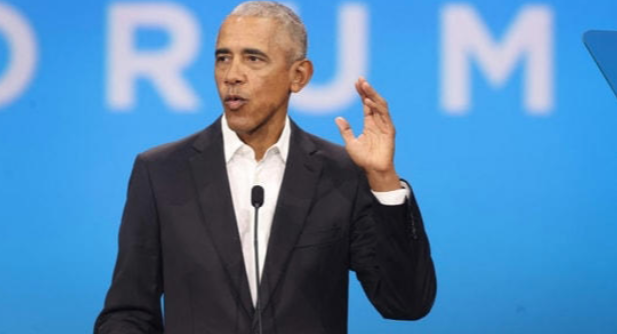Israel
Obama Voices on Israel War’s Dual Tragedies

In the virtual realms where the din of war is condensed into snippets and swift tweets, a seasoned diplomat lends his voice to the discourse on the Israel war. Barack Obama, whose tenure as the commander-in-chief of the United States intersected with the longstanding conflict, now wades into the contentious Israeli-Hamas narrative with the weight of his presidential legacy. His appeal, imbued with the gravitas of his tenure and a contemplative gaze backward, calls for an acknowledgment of both the tragedies and the relentless realities woven into the fabric of the Middle East.
The land marred by the Israeli-Hamas conflict is a canvas of historical agony and fervent national aspirations. The threads of this enduring struggle are woven through centuries of Jewish history marked by persecution and resilience, and decades of Palestinian yearning for self-determination. In this landscape, the October 7 attacks by Hamas stir the sediment of a complex past, evoking a new wave of scrutiny from a world audience too often swayed by the reductive narratives of social media activism.
Amongst the debris of Gaza’s ravaged streets and in the silent grief of Israeli towns, the ledger of human suffering is etched with the grim finality of loss and the pervasive dread of what may come next. In these spaces, the wail of sirens and the dirges of the bereaved become the soundtrack to narratives that bleed far beyond the ephemeral confines of digital screens and social media feeds.
Here, we find the essence of conflict, not in the abstract blur of news cycles but in the stark relief of stories untold and lives cut short. Children’s laughter has been replaced by an aching void; the dreams of youth lie buried in the rubble. In the borderlands where rockets crisscross the sky, fear is the unwelcome companion at every meal, every school lesson, every bedtime prayer.
But look closely, and you will see resilience in the tired eyes of those who endure, hope in the shared meals of neighbors, and defiance in the very act of surviving another day. In this crucible, the human spirit is tempered and tested. The people here have become alchemists of the soul, transmuting the base metal of their suffering into a kind of gold – the unyielding will to live, to rebuild, to remember, and to resist the notion that this is how their story must end.
Obama, in his plea, confronts the dueling realities of atrocity and suffering, challenging the observers’ penchant for simplicity. The binary of aggressor and victim becomes blurred in his narrative, urging an admission that history is not one-dimensional and that culpability may be shared. His reference to anti-Semitism’s dark specter and its influence on Jewish psyche provides a poignant reminder that collective memory often fuels the engines of conflict.
The former President’s critique of “TikTok activism” underscores a growing concern: the dilution of nuanced discourse in an age where complexity is often sacrificed for virality. He laments the lost middle ground, where the grim intricacies of geopolitical strife are overlooked for the sake of maintaining moral righteousness. Obama’s intervention suggests that to truly engage with the Israel-Palestine dilemma, one must confront the uncomfortable paradoxes that define it.
Obama’s words, a solemn incantation, seem to hover over the theater of conflict like a weary ghost of his presidential past. The despair of Palestinian civilians juxtaposed against the fear etched in Israeli faces, all under the relentless Middle Eastern sun, is a tableau of shared humanity. It’s a reality punctured by the cries of the bereaved and the wail of rockets, a landscape where the horrific and the unbearable are inextricable companions.
As Obama’s voice fades into the repository of historical commentary, the enduring question he poses lingers in the air, heavier than the smoke over Gaza or the dust of Israeli streets. Can a world fixated on binary narratives embrace the complexity required to navigate towards peace? His discourse leaves us pondering whether the acknowledgment of shared culpability and the intertwining of horror and suffering could be the first tentative steps toward a path long sought but rarely trodden—the path to resolution and reconciliation in a land too accustomed to the language of war.
President Barack Obama has urged Americans to “take in the whole truth” when weighing Isreal war against Hamas, saying everyone is “complicit to some degree” in the conflict.
“Nobody’s hands are clean,” the 44th president said during an interview with “Pod Save America,” a podcast hosted by former White House aides from his presidency, in an excerpt released Saturday.
“What Hamas did was horrific, and there’s no justification for it. And what is also true is that the occupation, and what’s happening to Palestinians, is unbearable,” said Obama, 62, explaining that the only way to solve the crisis is to accept those seemingly contradictory ideas.
“And what is also true is that there is a history of the Jewish people that may be dismissed unless your grandparents or your great-grandparents or your uncle or your aunt tell you stories about the madness of antisemitism,” he said.
“And what is true is that there are people right now who are dying, who have nothing to do with what Hamas did. … We could go on for a while,” he said.












You must be logged in to post a comment Login